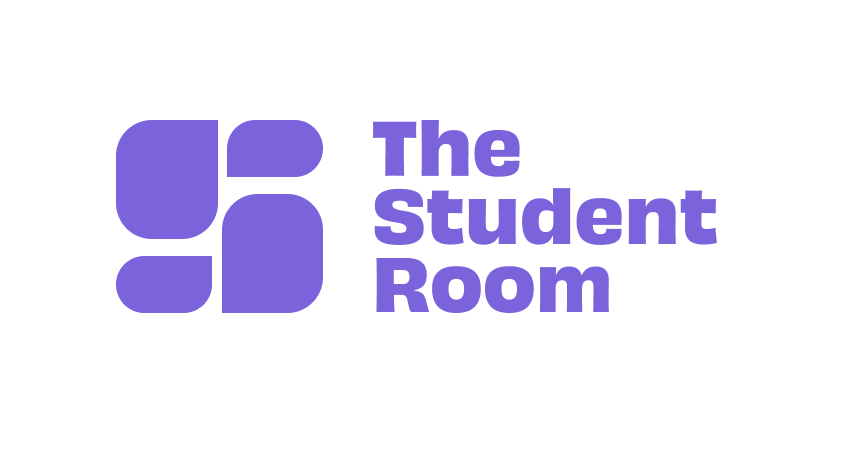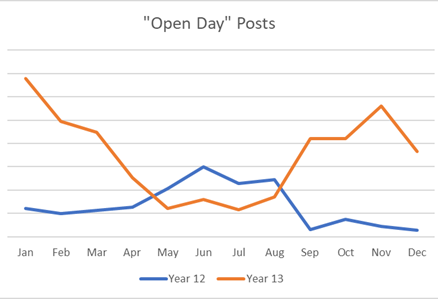Applying to university is a huge decision for students. But do you know what they’re going through at each stage in the application process?
Today we’ll share a roadmap, with examples from real students, to identify the key milestones and questions in the student journey. You can use this to plan relevant content and identify the best times to interact with university candidates.
Year 11: Exams, choosing sixth form subjects and initial university research
In Year 11, students are focused on revising for their GCSE exams, but they also start thinking about the future. Those continuing at school choose a sixth form as well as their A-Levels, BTECs or IBs. Students in Year 12 and 13 study far fewer subjects, so Year 11s need to consider what they want to do at university and pick appropriate supporting subjects.
Here’s an example of the types of questions year 11’s are asking to prepare for university applications:
“Please help me choose A-level subjects” – This student is deciding which A-level subjects will help him when applying for an Aerospace Engineering course at university.
Top tip: Students may not be aware of all the courses that are available to them at university. (e.g. Marine Science). Why not promote these options alongside more familiar and related courses? (e.g. Biology)
Year 12: Subject specialisation, studying and university open days
For the first time, students have control over their education. Year 12s study subjects they have chosen, in much greater detail, so they can make more informed decisions about their university courses. While students develop a deeper understanding of their strengths and preferences in Year 12, this can still be a confusing time. Unsurprisingly, students turn to parents, teachers or peers for guidance about which universities they should consider. Our research shows 37% of students from poorer socio-economic backgrounds are discouraged from applying to university by adults they seek advice from.
Although Year 12s start to attend Open Days from September, it is more likely they will visit universities from June onwards. At the end of the school year, students are more familiar with their subjects, so they have a clearer idea of what they are looking for.
Take a look at how Open Day activity peaks differently in Year 12s and 13s:
Top tip: Make sure your strategy includes early engagement if you are expecting Oxbridge, Medicine, Dentistry or Veterinary applicants (early UCAS deadline in October i.e. in the first term of Year 13).
Should I even go to university?
Students have a lot to consider when deciding what to do after school. They may be asking questions like:
- What did my older siblings do, and will my parents approve of my choices?
- Should I take a year out for work experience or travel?
- Will a degree help me to get a better job?
Think of these questions as objections offering a great opportunity to engage with useful content. For example, “Will a degree help me to get a better job?” is really saying “Is university worth it in terms of advancing my career prospects, or would I be better off getting a job now?”
Top tip: To influence this student, you could share great employability statistics or quotes from alumni with flourishing careers at recognised companies.
According to our research, this is the order in which students make decisions about their university options:
-
- Course
- Career
- The University
- City/Location
- Affordability
- Campus or home living
Top tip: Plan a staggered content strategy covering each of the six decision-making points in order. This will demonstrate you understand the student journey and how your university ticks all their boxes.
Year 13: A-Levels, open days, personal statements and applying to university
Autumn Term
From the moment the Autumn term begins, Year 13s across the country start preparing to apply to university. UCAS applications open in September, so we see many students turning to The Student Room for advice at this time. Users ask about a variety of topics, such as what course to study, where to apply, how many Open Days to attend, how to write a personal statement and clarification on the Track and UCAS application process.
This is a crucial time for Oxbridge, medical, dentistry and veterinary candidates, who must finalise their applications by 15th October. In November, these students receive decisions about whether or not they have been invited to an interview.
However, the majority Year 13 students will attend Autumn Open Days between September and November to narrow down their university options before the January UCAS deadline.
The Student Room plays an important role in the decision-making process. 75% of students use our forums, seeking advice and opinions on different universities:
- ‘’I want to study medicine (or a Biology-based course) but I have no idea which unis to look at.’’
- “I’m from just outside London and want to go to a campus uni. What do you think the best option is?”
- ”At the moment I’m tied between Brunel, Southampton and DMU. But I can’t make my mind up.”
- “When is the right time to send UCAS applications?”
Top tip: Read our blog on improving Open Days and this infographic on designing effective creatives and display ads to supercharge your campaign.
Christmas holidays
Christmas is traditionally a time spent with family, but some students need to revise for their mock exams in January. As a result, we see many users on The Student Room accessing resources for study help and support:
‘’Revising for mock exams during the holiday season’’
UCAS applications are also on a lot of students’ minds over Christmas break. During the holidays, students can’t ask their teachers for help, so they often use online forums to find advice and support:
- ”My aim is to send it on 28th December!”
- “Criminology personal statement help”
- “Sending your Uni application in January? Is it too late?”
Top tip: Official Reps can engage with candidates on our forums by providing the answers they need to finalise their decision. Students trust university Official Reps because they are a useful, authentic and expert voice of authority.
Spring Term and Easter holidays
At the start of the second term, most students are focused on the 15th January UCAS application deadline. They may be feeling anxious if they have put it out of their minds over Christmas and left it until the last minute.
As the January 15th UCAS deadline draws closer, students tend to panic about their references and personal statements:
- “Stressing out like crazy because the person who is supposed to be my reference doesn’t look like they’re going to be able to help me before the deadline.”
- ‘’My college cant do my reference until Tuesday which is the deadline date’’
- “If you are getting a reference from a school does it have to be from the headteacher?”
Students who applied to Oxbridge or through a High Achievers initiative will be attending interviews or receiving their offers from January:
“Received an offer to study BSc Geography at Nottingham through their high achiever’s initiative”
Once the UCAS applications are completed, students must arrange finance, scholarships, bursaries, and accommodation. Those who do not receive offers can use UCAS Extra from February onwards to find more university options. Students with offers have until April to decide which universities to put as their firm and insurance choices. Some Year 13s will also be revising for Spring Term mock A-Level exams, so this can be a very busy and stressful time.
Top tip: Share advice content about applications or writing a great personal statement (make sure you share this in an appropriate location where students will see it).
How to get started
Don’t worry if all this information feels a little overwhelming. Here at The Student Room, we have a team of industry experts who are ready to help you. We’ll talk you through the best engagement times and advertising options for your university.
We can also advise you on planning a holistic annual student marketing strategy and deliver the campaign and reporting for you.
As a starting point, why don’t you let us know what your current challenges and ambitions are?
Call 0800 999 3222 or email hello@thestudentroom.com
Author: Katie Hale









